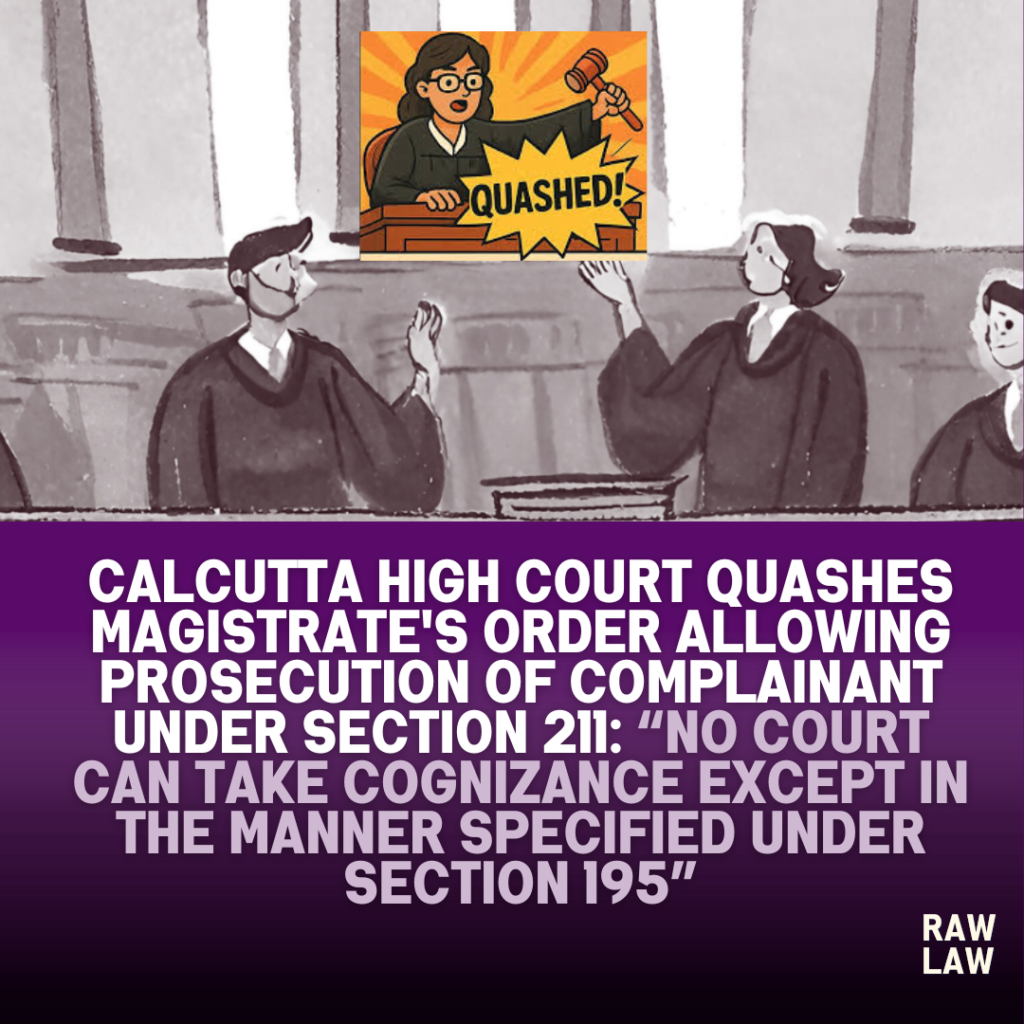Court’s Decision
The Calcutta High Court set aside the portion of the Magistrate’s order that permitted the initiation of prosecution against the complainant under Section 211 of the Indian Penal Code. The Court found that such prosecution could not be initiated solely on the investigating officer’s request, but only in compliance with the procedural safeguards of Section 195 of the Criminal Procedure Code. However, the Court upheld the Magistrate’s acceptance of the final report and the discharge of the accused persons, holding that it did not suffer from any perversity or impropriety.
Facts
The petitioner, eldest son of a deceased individual, alleged that his brother (opposite party no. 2) created disturbances over ancestral property and might have murdered their widowed mother. He claimed that their mother’s cremation was done in the absence of other family members, raising suspicion. According to the petitioner, his mother was pressured by the opposite party to hand over her immovable property. On the day she died, the petitioner was attending court proceedings, and upon return, found her already cremated without notice. A complaint was filed under Section 156(3) CrPC, leading to the registration of a case under Sections 302, 201, 176, and 34 IPC.
The police, however, submitted a final report concluding that the death was natural, due to cancer. The petitioner filed a Naraji (objection) petition, which was dismissed. The Magistrate accepted the final report, discharged the accused, and additionally directed initiation of proceedings against the complainant under Section 211 IPC.
Issues
- Whether the Magistrate was justified in accepting the final report and discharging the accused.
- Whether the Magistrate could permit prosecution of the complainant under Section 211 IPC at the instance of the investigating officer.
Petitioner’s Arguments
The petitioner contended that the manner in which the cremation was done in the absence of the other sons and the lack of opportunity to perform final rites indicated foul play. It was argued that there was sufficient animosity among brothers over the property, and the investigation was perfunctory, relying on forged documents. The Magistrate’s acceptance of the final report was said to be mechanical and not a speaking order. The petitioner relied on Perumal v. Janaki, (2014) 5 SCC 377 to support his contentions.
Respondent’s Arguments
The State submitted that materials in the case diary did not disclose any offence, and the investigating agency’s final report was justified. Statements of doctors and the deceased’s daughter corroborated the cause of death as cancer. Therefore, the Magistrate rightly accepted the final report. The State argued that there was no perversity in the order and it did not warrant interference.
Analysis of the Law
The Court examined Section 195 of the Criminal Procedure Code, which mandates that no court shall take cognizance of offences under Section 211 IPC unless there is a complaint in writing by the court where the alleged false accusation was made. The Court clarified that only the court concerned, or a duly authorized officer, can initiate such a prosecution. Thus, it held that the Magistrate’s act of allowing the investigating officer to prosecute the complainant without following the procedure under Section 195 CrPC was impermissible.
Precedent Analysis
The Court referred to the decision in Perumal v. Janaki, (2014) 5 SCC 377, where the Supreme Court underscored the procedural safeguards before initiating prosecution under Section 211 IPC. The Calcutta High Court used this precedent to reinforce that a person must be given an opportunity to substantiate their allegation before being prosecuted for making a false charge.
Court’s Reasoning
The Court observed that the deceased’s daughter had made a statement under Section 164 CrPC confirming that her mother died of cancer, and the treatment records corroborated this. The petitioner himself had indicated willingness to settle the case if property disputes were resolved. These factors led the Court to conclude that there was no reason to interfere with the acceptance of the final report. However, the decision to prosecute the petitioner under Section 211 IPC at the behest of the police, without following Section 195 CrPC, was held to be legally flawed and thus was quashed.
Conclusion
The High Court upheld the Magistrate’s order accepting the final report and discharging the accused but quashed the direction to initiate prosecution under Section 211 IPC against the complainant. The Court reiterated that such prosecution requires compliance with Section 195 CrPC and cannot be initiated merely on the police’s request.
Implications
This judgment affirms procedural safeguards against misuse of Section 211 IPC. It emphasizes the judiciary’s role in initiating such prosecution through a complaint under Section 195 CrPC and restrains investigative authorities from bypassing judicial safeguards. It also illustrates the Court’s cautious approach in interfering with final reports unless there is a clear error or perversity.
Judgment Cited and Its Relevance
Perumal v. Janaki, (2014) 5 SCC 377: The Supreme Court held that prosecution under Section 211 IPC must follow due procedure and the complainant should be given an opportunity to prove their case. This principle was used by the Calcutta High Court to invalidate the Magistrate’s order directing prosecution without following Section 195 CrPC.
FAQs
- Can prosecution under Section 211 of the Indian Penal Code be initiated on a police officer’s request?
No. As per Section 195 of the Criminal Procedure Code, only the court concerned or its authorized officer can initiate such prosecution through a written complaint. - What was the main ground for upholding the discharge of accused persons in this case?
The Court relied on medical evidence and statements confirming that the deceased died of cancer, and there was no prima facie material to support a charge of murder. - Why was the Magistrate’s order partially set aside? Because the order to prosecute the complainant under Section 211 IPC violated Section 195 CrPC, which mandates that only a court can initiate such prosecution by a formal complaint.



